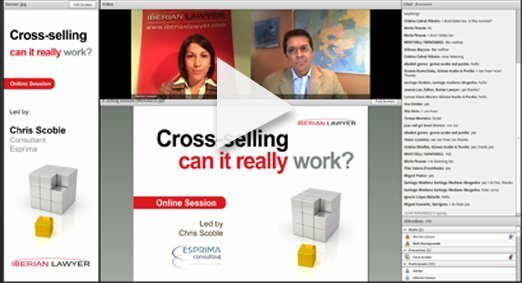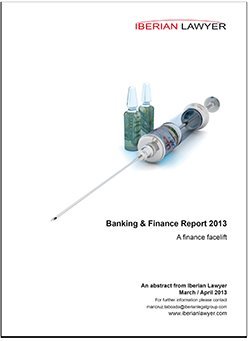Cross-selling : Why is it so hard?
A group of senior lawyers and business development managers from Spain and Portugal’s top law firms recently participated in an Iberian Lawyer online session to discuss the main obstacles they face when developing an effective client cross-selling process.
The session was led by Chris Scoble from Esprima Consulting, a consultant for law firms worldwide advising on strategy and marketing and how to win new work.
Addressing the challenge
Cross-selling is identified as a key route to higher revenues and client satisfaction, but few law firms have successfully addressed this challenge, said Scoble. Commentators suggest that lawyers have a number of difficult years ahead, as the effects of the recession have been felt across what is an already very competitive market.
Never before has there been more emphasis on lawyers to develop closer relations and potential new working practices with existing clients. Effective cross-selling, therefore, stands out as a key tool for law firms to thrive in these challenging times.
Benefits
There are many benefits that can be derived from successful cross-selling within a law firm ─ increased revenues from existing clients, for example. As the number of services provided increases, so does the amount of billing. Also it has the advantage of protecting existing relationships, as if there are numerous contact points with a client, the law firm is more likely to hold on to them as a client – even if they choose another provider for one of those services.
And as clients have a broad and deep experience of the law firm, its people and its offerings, they are more likely to recommend to other potential clients thereby increasing referrals.
Given these potential benefits, Scoble addressed the question of why it is so difficult to make cross-selling really work. He identified four principal obstacles that were then ranked by the participants in the following order: lack of organisation and information; lack of confidence in other partners; reward and recognition processes that are not aligned to the aim of cross-selling; and lack of knowledge/awareness of the services offered by other parts of the firm
Of course, said Scoble, the realities and challenges vary greatly depending on the size, nature, history, structure and philosophy of the different law firms. A multi-national firm with representation across numerous practice areas, sectors and offices needs to address the cross-selling challenge in a different way from a single-office, boutique firm with a tight sector focus and few practice areas. However, to a greater or lesser degree, the above obstacles need to be addressed by any firm wishing to maximise its ability to cross-sell. Scoble identified certain practical things that law firms can do.
Organisation and information
A law firm needs to look at whether it is really organised and focusing its effort on its key clients, and whether it has a programme that targets specific clients to grow the relationship.
Also to look at how well the firm knows these key clients, and Scoble suggested a formal client review would serve to gather the necessary information to allow further products and services to be introduced. The law firm should also look at whether information on a given client is readily available across the whole firm.
Confidence in other partners
On the one hand, said Scoble, lawyers are worried that their partners may let them down in the eyes of the customer by not providing a good service. On the other, there may be a fear that their partner may try to ‘steal’ that client from them. In either case, this represents a major block to successful cross-selling, as well as a sign that all is not well at the heart of the law firm.
Better understanding of other areas will go some way to addressing this, but it will take time to turn around this problem. The most direct way of addressing this is by example from the firm leadership ─ a clear demonstration of the desired attitude and behaviours will, over time, be reflected at all levels, said Scoble.
Recognition and reward
If cross-selling is seriously part of the firm’s agenda, Scoble recommended that this should be reflected in the appraisal system, and remuneration. If the first item in the annual appraisal meeting is how successful a lawyer has been in introducing work to colleagues in other areas, this will send a message. And if a significant part of a lawyer’s financial reward depends on the same, there will be a very good chance that that message will be well understood.
Knowledge and education
Key elements here are regular meetings, both formal and informal, of lawyers working in different practice areas─ it will not help the firm, or the client, if the teams operate in silos, said Scoble. Internal newsletters sharing success stories, and technical or sector updates spreading knowledge to the wider group will also support the cross-selling effort. And making cross-selling the opening item on any internal meeting agenda will serve to focus the mind.
All these obstacles can be overcome with the necessary attitude and determination, but perhaps the two key elements for true cross-selling success are, Scoble concluded, an unequivocal demonstration of the right attitude and behaviours from the leadership of the firm, and a clear and relentless focus on the one single thing that matters most – the client!
View the full recording of the Online Session here:
|
Subscribers only: See the whole recorded session by logging in first and then click here. |













